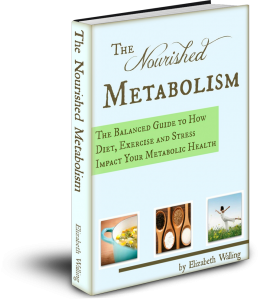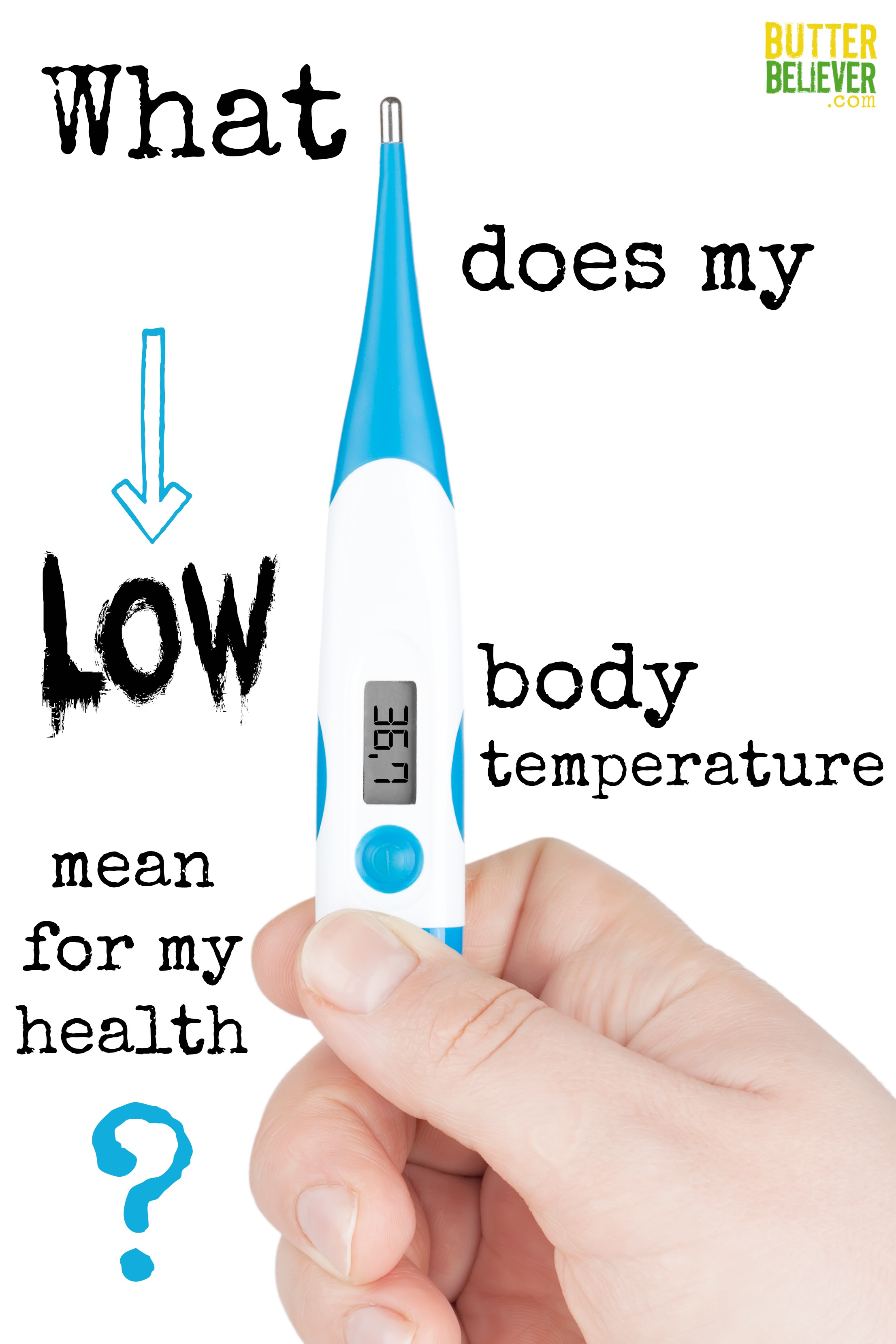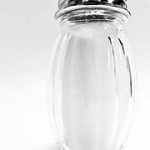Do you have a low body temperature? Or did your doctor tell you that a lower body temperature below than the standard 98.6 was still “normal,” and not to worry?
A low body temperature, while becoming increasingly common, is still not in fact, “normal.” It’s actually indicative of poor health.
Why? Because a low body temperature is a sign of a low metabolism. And with a low metabolism, all of your body’s systems can’t function the way they were meant to. It really is that important. And your low body temperature should be taken as a serious sign that your body needs healing.
Low body temperature: Your first sign that the body’s metabolic rate is failing
Dr. Broda Barnes, a pioneering endocrinologist from the last century, was among the first to begin to consider the body temperature as an outward marker for the body’s most basic functioning—cellular metabolism. He noted that patients who presented with the symptoms of a low metabolic rate—lowered thyroid function especially—also generally presented with a lowered body temperature which was typically 97.8 or below. Barnes contended that the body temperature was actually by far the clearest indicator of lowered metabolism and low thyroid function—much clearer in fact, than even blood work and lab results. His work has influenced many physiologists and endocrinologists that followed, and today, it is well-known that body temperature is indeed a biomarker for metabolism and thyroid function.
What this essentially means, is that a higher body temperature is a reflection of a higher metabolism, while a low body temperature will indicate a low metabolism. It’s critically important, because your metabolism is essentially how well your cells are able to convert fuel to energy.
And just about everything in your body needs that energy to function. Everything from your digestive system to your liver and all other vital organs; to your endocrine system and all its critical hormones; to your brain and nervous system—everything relies on how well your cells produce energy.
So when your metabolism is low? You’ll start to see symptoms like these:
- Poor digestion and food intolerances
- Constipation or abnormal bowel movements
- Cold hands and feet
- Frequent urination
- Mood swings and instability
- Dry skin and/or skin disorders such as acne and eczema
- Thin, brittle hair and nails
- Sleep problems and insomnia
- Exhaustion and a “wired/tired” energy level cycle
- PMS, infertility, low sex drive and other hormonal imbalances
- Blood sugar crashes and instability
- Susceptibility to illness
- Weight gain, particularly around the midsection
- Chronically low body temperature
Yes, metabolism means how all of your body’s systems are fueled at the cellular level. It’s a big, huge, really big deal. And it needs to be working properly in order for your body to be in good health. If you’ve got a low body temperature, that’s your first sign that you need to work on improving your metabolism so you can improve overall health and avoid the damage and disorders that can accompany a lowered metabolism.
But, first thing’s first. Do you have a low body temperature?
How to Determine if Your Body Temperature is Too Low
When was the last time you or your doctor took your body temperature? If you can’t remember, now’s the time to figure it out.
First, you’ll need a good thermometer. I use and recommend this particular digital thermometer, as it’s designed to give an accurate reading of your basal temperature, which is what you’ll be taking.
[easyazon-image align=”center” asin=”B006F5BCLA” locale=”us” height=”160″ src=”http://ecx.images-amazon.com/images/I/41H0yvty3pL._SL160_.jpg” width=”76″][easyazon-cta align=”center” asin=”B006F5BCLA” height=”28″ key=”amazon-us-small-light” locale=”us” width=”120″]
Now, to do this, you’ll want to take your temperature first thing in the morning—before you even get out of bed to pee. This is what’s referred to as your basal body temperature, and it’s the most accurate way to see where your body’s temperature stands, without any other factors such as things you’ve eaten, or your level of activity coming into play. It’s how your body is regulating its temperature while in a resting state.
What’s too low?
If your thermometer is reading anything less than a 97.8, that’s a low body temperature. And as you now know, it’s indicative of a low metabolism.
Don’t get too freaked out over this—many people commonly have body temperature readings that are quite low. Chances are, this has been the average for your body for a while. But that certainly doesn’t mean that it can’t, or shouldn’t, change.
What is scary to me though, is that a low body temperature is becoming the new “normal.” There was actually an article in the New York Times entitled, “Rethinking 98.6,” as though we really ought to consider the epidemic of low body temperature as being clinically acceptable!
I couldn’t agree more with Matt Stone’s rebuttal of the article, in stating this:
“Body temperature is so significant that it is virtually impossible to develop heart disease or type 2 diabetes while maintaining a healthy, albeit abnormal body temperature of 98.6 F into old age. Whatever your health problems are, don’t give up until you’ve brought that temperature back to normal. There are countless tips and strategies to do this, and it certainly doesn’t require starvation dieting, overexcercing, and the like, which lower body temperature like nothing else can.”
How do you fix a low body temperature?
So, what do you do if your body temperature is too low? Well, the cause of the low body temperature is a low metabolism. And the cause of a low metabolism could be many things.
What can affect metabolism the most?
- Your diet, and especially whether or not you restrict what you eat. Restrictive dieting can severely hurt metabolic function.
- Your level of physical activity—both too little activity and too much activity can negatively impact metabolism.
- Your sleeping habits—too little sleep, or poor quality sleep, will impact metabolism significantly.
- Your level of stress. This is everything from psychological stress from a busy lifestyle or difficult life circumstances; environmental stressors such as exposure to toxins; and physiological stress from the body’s stress response running on overdrive, causing damaging stress hormones to be activated too much of the time.
Improving these metabolic factors isn’t as difficult as you might think. Here’s some simple steps to take to improve each of them.
Diet
- Eat an appropriate amount of food. Many people, even those who are overweight, do not eat enough food to support their level of activity. This only serves to make the body think its experiencing a famine—and it causes the metabolism to slow down, so you can make the most use of the limited amount of fuel your body is getting. Not good.
- Don’t restrict the types of foods you eat. Learn the basics of how to eat healthy, and make sure your diet is balanced. We’re talking, a good amount of all three of the big macronutrients—fat, protein, and carbohydrates. They all are very important in supporting metabolism.
- Your cells need fuel for energy—and that includes a careful balance of glucose and electrolytes, including sodium—this is the stuff your cells’ “batteries” are made of. That means your diet needs to be balanced between sources of caloric energy, sodium, and fluids. Drinking too much water, and not eating enough sources of glucose and salt, can cause your metabolism to crash, and your body temperature to plummet.
Activity
- If you’re sedentary, find ways to work in small amounts of physical activity, and continue to make progress from there. Make the activity you do enjoyable—it doesn’t have to be a “work out!” Just going for a short walk each day may be all you need to start working in a healthy level of activity to support metabolic function.
- Don’t overdo it. Exercise can backfire on you—if it’s too much physical stress on your body, it can hurt your metabolism.
Sleep
- Get on a sleeping schedule. Everyone knows that you should be getting at least 7-8 hours of sleep a night, but if you don’t plan for it, it won’t happen. Making sleep your top priority is a great way to see big improvements in your health, in a relatively short period of time.
- Start a calming bedtime routine that includes turning off stimulating lights from your computer and other screens, taking time to wind down, and eating a blood-sugar leveling snack to keep things stable through the night. A piece of cheese and some fruit works great!
Stress
- Address psychological sources of stress—emotional disturbances, unhealthy relationships, or stressful situations. If you can make a change in these for the better, do it. Get the support you need to help you through.
- Adopt therapeutic lifestyle habits. Allow time every day for downtime and relaxation, and even stress management activities and techniques like meditation, yoga, aromatherapy, or calming baths.
- Work on managing the environmental stressors in your life—even something as simple as spending too much time indoors and not getting enough sunlight, or being exposed to things which you are allergic to, can be sources of physiological stress.
This last one is what it all really comes down to. A poor diet, bad exercise habits, and lack of quality sleep are all physiological stressors in and of themselves, and contribute to a stressed metabolism. To fix the stress from all sides–emotional, physical, and physiological—these basic lifestyle changes need to be addressed first.
Want to learn more about body temperature and metabolism?
A low body temperature and a low metabolism can be nourished back up to health. There are very specific ways to address this type of healing that can quickly bring about powerful changes in your body’s health and functioning. But, wading through all the sources of information out there about this stuff can leave you very confused and with conflicting advice that may not get you where you need to be.
 That’s why I highly recommend reading The Nourished Metabolism by Elizabeth Walling. It’s the most simple, straightforward guide to achieving metabolic health that I have come across.
That’s why I highly recommend reading The Nourished Metabolism by Elizabeth Walling. It’s the most simple, straightforward guide to achieving metabolic health that I have come across.
If you just want to know why you have these symptoms you can’t seem to shake, and what to do to start feeling better fast, without having to make drastic or difficult changes in your diet or day-to-day life, this is what you need. You’ll learn everything from how to improve your digestion, to how to start sleeping better tonight, and all the steps you need to get your metabolism up to speed and be healthier than ever before. And it all starts with taking that temperature reading!
There are also a couple other books I recommend for further reading and education on these subjects. Diet Recovery 2 by Matt Stone, specifically addresses those who have struggled with yo-yo dieting, fad after failed fad, and guru after failed guru, only to end up in worse shape than when they started. And that unfortunately describes a lot of us.
Another of Matt’s books, Eat for Heat, goes into the specifics of how to tweak your diet for the most bang-for-your-caloric-buck improvement in body temperature. You’d be surprised at how simple and easy it can be to raise the number on that thermometer after reading this.
With these resources, you can make huge strides in improving your metabolism and raising your low body temperature. It truly is the key to health, so don’t waste another day struggling with all those icky symptoms and freezing cold body temperature! You can start feeling better fast once you implement these changes and crank up your body’s thermostat, so get to work on getting hot!
Do you have a low body temperature?
What symptoms have you experienced along with it? Are you still struggling? Or have you been able to raise your temperature and fix your metabolic health? Tell us about it in the comments below.





I’m reading Matt Stone’s Eat For Heat right now and I gotta say that the concept is totally new to me. I’m open to it, of course, because I want to fix my metabolism. I haven’t been able to shed any of my baby weight and between a low metabolism and postpartum hormones I’m really not that surprised.
I just took my temp with my basal thermometer, something I have from my fertility tracking days, and it came to 97.9. I think I need to work on that 😛
Great Article Emily! Very comprehensive summary! I’m just getting into the nourished metabolism and matt stone’s books and I’m excited to be learning all this new stuff!
What perfect timing for this to turn up in my inbox!
I have been reading all of the books mentioned (including yours Emily) and I am very very fascinated by it all. I am pregnant with my 2nd child and I have many of the low thyroid symptoms described above, despite being a ‘healthy eater’ (or so I thought until I read your book a few weeks ago).
I have been eating gluten free for 4 years now and in that time have gotten more and more into eating sugar free and low carb/grain free. Despite being pregnant, when you are supposed to get hotter, I have a basal temp of 35.7C. I am also very thin and have been my whole life!
I really don’t know what to do to raise it as I am worried about any effects on bub? I’ve been eating whatever I want in the last few weeks and feel rather awful for it, but do I take this as a good sign and try to chill out, enjoy the weight gain and trust my body? It seems like raising my temp could take a long time and it feels like I am getting nowhere.
Loved the article thank you 🙂
I have been taking my body temp every morning of every day for the past 19 months, tracking my fertility cycle. When I am pre-ovulatory, my temperature is usually below 97.8 and when I am post-ovulatory it has been above 97.9, on a constant basis, with occasional temp drops to around 97.1 around ovulation day and a rare high of 98.9 premenstrually. Average variance 97.3-98.4. In the book Taking Charge of Your Fertility, it is explained that this temp shift is in response to the shifting hormones of the fertility cycle and my temps are in the range of average Toni Weschler gives in the book. The symptoms I experience from the list you gave are: Mood swings and instability, exhaustion (and maybe “wired/tired” although I don’t quite get it), and self-diagnosed drops in blood sugar. I have been feeding myself a whole foods for 3yrs and counting. I have given thought to the idea that I may have too low a body temp and also I feel confused about this topic.
My body temperature dropped significantly about fourteen years ago after I had six new placements of mercury amalgams in my teeth. You notice this when you’ve always been 98.6. To this day, it remains low, as low as 96.2, averaging around 97. My doctor continues to tell me this is in the “normal” range, however my health has also plummeted. Please don’t blame it on aging or fat; fat is part of the problem of the hormonal processes that changed. My research re: mercury amalgams revealed the displacement of an oxygen molecule at the cellular level with the mercury which does not eliminate from your body through urine because it is a heavy metal, not water or fat soluble(I don’t remember if this was Weston A. Price or another researcher I read). If your cells change because of oxygen displacement with mercury, it makes sense to me that your hormonal processes of metabolism will also be disrupted. I have changed diet and food sources, added and increased exercise, worked on reducing stress (as if!), solicited doctor’s advice, and I remain convinced that little will change for the better until the mercury is removed. This theory however is not in the modern medical paradigm and is difficult to get medical assistance with, nor does it fit into nay of the little insurance boxes. I continue my search for better health. I’d like to feel better before I die. Most citizens of the United States have mercury amalgam fillings in their teeth. Maybe the low temp is the new normal because we are being mercury poisoned.
Look into Wilson’s Temperature Syndrome. I feel as though it is describing me. I have had decreased body temp and mental fog along with several other issues that look like a thyroid problem but all my labs come back normal. My doctor is giving me just T3 and I feel better than I have felt in years.
I find it very interesting. My husband and a few of his family memebers run around 95 or 96 degree temps. That’s how they have always been. Generally, they are in very good health and have good metabolisms. I don’t think a low temp is always an indication of poor health. Maybe they are just genetic freaks. Who knows.
I’m a-wondering about all this. It was good to get the hypothyroid diagnosis that I got 8 years ago, since my health had so badly deteriorated (despite extreme measures to nourish myself by eating/exercising/etc.) I now indeed felt better than I’d felt for years (thanks, Thyroid meds).
But now that I’m experimenting with different thyroid meds, I’m back to monitoring my temperature. And I find that my resting temp (1st thing in the morning) can be as low as 93.6, but averaging 95-96.6. Talk about ridiculous!
And yet I’ve been feeling good. So, thank you, Tai, for sharing about your husband’s family. I do feel like I might be a genetic freak, haha! Just for the record, I suspect that maybe I’ll always register a lower-than-normal temperature…
I must be a freak then to my normal body temp first thing in the morning is 96.1 and throughout the day it runs between 95.8 and 96.8
If I am any higher I feel like total crap. I feel sick and unable to eat. I get so cold my teeth chatter. It isn’t until it is back down to no higher than 97.2 that I feel anything like my self. Does anyone else have this issue that has a low body temp
I have the same issue! You’re the first person I’ve read that understands. Dictors don’t believe me. This wouldn’t concern me much but that I’ve had amystery illness for two years. I’ve been developing almost daily (what I call) “fevers” which accompany significant fatigue & the feeling like I’m getting the flu. The so-called fevers only read between 99.5 & 99.7 on average so doctors discount it as the general inaccuracy of digital thermometers combined with “normal range” temps. Problem is on days I’m feeling well & my energy level is normal my average temp is 97.2 to 97.5. Big difference.
As long as I can remember I’ve run low when healthy. Now my temp is elevated & I feel ill more days than not, and no blood test or exam has found anything – and I’ve been searching….
This is an excellent article, Emily!
I take my temp every morning for reproductive purposes. My temp is always between 97.0 and 97.8 during the first half of my cycles and 97.9 to 98.5 after ovulation. When I was pregnant, my temp was higher than 98.5. It seems like it would be wise to take your temps for a whole month to see how they change, if at all. They should be lower before ovulation and higher after ovulation, them drop again during mensuration.
Great article! The one small point I would disagree with is the bedtime snack recommendation of cheese. Eating cheese and then lying down can lead to uncomfortable reflux symptoms, due to the large amount of fat in most cheeses. I know this from personal experience. I started experiencing some scary symptoms, which led me finally to visiting a GI doc (and I usually avoid MDs like the plague, so you know it was bad). After my exam, she quizzed me on my eating habits. It was quickly determined that it was my nightly habit of snacking on cheese prior to bedtime which was causing my distress. Once I eliminated the cheese, I never had the symptoms again.
Nicely highlights the use for a good digital thermometer! Thanks for all the information. I run hot, so I’m pleased to read that backs up my ideas on a high metabolism.
I have had a low body temperature for awhile now. The doctor doesn’t seem all that concerned about it. My thyroid has been checked numerous times & it’s “normal.” If I take my temp first thing in the morning…it’s usually 94.0-96.0. Later in the day it MIGHT get up to 97.0 or so, but never gets up to 98 unless I have a fever. So a fever to me is 98 degrees & above. I have some other symptoms going on….body fat around my mid section, where I didn’t have a problem before, though I have always been a bit on the heavy side. Tired, stuffy nose, etc.
Tammy did this happen all of a sudden out of no where, and was your temp always normal as in the 98.5 area ?
Tammy- you should want to find another doctor who will do more than a TSH test and tell you that you are “normal”. You resting body temperature is a much better indicator of your metabolic health and your thyroid gland. A TSH test on tests to see if your pituitary gland is sending a message to your thyroid to make T4. There are many other problems down the line that are not diagnosed with a TSH test.
All your temps are very low. I hope you get better medical advice! Good luck-
^^ditto, ditto, ditto.
Thank you for your insightful comment, Lianda.
Hi,
When your thyroid TSH was checked …was it at 2 or 3 ?
Normal used to be below 5 on old guidelines. New guidlelines are aiming for 2 to 3.
If your TSH is above 3. You are probably HYPO.
Hope this helps.
Gail
Thank you for this article! The last few times I’ve given blood, my temp has been around 97.8. I’ve been anemic since I was in 5th grade (many, many years ago) so I’ve always believed that’s what caused my cold hands and feet. But most people – myself included – would say that I have a great metabolism: at 50, I weigh 122, give or take a couple pounds, am 5’7″ and eat what I want. That said, I tend to eat a lot of healthy and real food, just lower quantities than most people. I do exercise about an hour a day 5 days a week. So… I would still think my metabolism is pretty high. Am I wrong? I do wonder if I do have some sort of thyroid issue; unlike most of the population, I tend to lose weight in the colder winter months. For example, I can polish off a small plate of Christmas cookies and have no weight gain. Every day. In the summer though, even if I’m more active and eating foods out of my garden, it’s much harder to keep my weight steady. Any thoughts? I never think to bring this up during my annual visit to the doctor; he always tells me I’m super healthy for my age.
With roughly 5 hours of exercise a week, you SHOULD be healthy!
😉 dear me… I’m struggling with doing 3 hours tops in a week
I’ve been working on raising my metabolism for a few months now. When I first started my temperature was in the 96’s and I actually saw a 95! After just a couple of days of eating and sleeping more and cutting back cardio it jumped to the 97’s. Now it seems like it is stuck. I occasionally see a 98 after eating. I saw a 99 after a nice warm cup of milk with coconut oil the other day! i was even dripping sweat! Do I just stay the course and it will eventually hit 98 on a regular basis? I know it is silly but I gained about 10 lbs during this and would like to cut back just a little and add more cardio back in to lose some of it.
If you want to exercise, by all means, do! Cardio tends to be more taxing on a hypometabolic person than other forms of exercise (as you’ve noticed by the drop in temps), but as long as you’re eating the right amount of food to fuel this activity (see here: http://www.health-calc.com/diet/energy-expenditure-advanced), and it’s what you enjoy, go for it (in moderate amounts, I’d say).
Depending on age and lots of other factors, getting your temps up to a normal range can take anywhere from weeks to years, from what I’ve seen. But yes, I would say to stay the course, because these are healthy habits that should be maintained indefinitely for the most part—the eating appropriate amounts of food, sleeping more, that sort of thing.
I recommend reading Taking Up Space for more info about eating to lose weight, in a healthy way: http://amzn.to/13Uv3Cx
What does it mean if my temps in the morning are always above 98.0? I have been keeping track for around a month and today it was 98.7! I have 7 of the symptoms that you mention. Could it be adrenal for me and not thyroid?
AS I understand it it could be hypERthyroid if you are running to hot
This makes a lot of sense, My body temperature has been exactly 97.1 since i was 14 years old, that is also the time I started Birth control, High school, and my first job. It was also the time when my weight went from an alright 140(little overweight) to 173( big belly double chin, bright red face) at least by the time i was 16. I am 5’4. I’ve had all of my thyroid functions checked out to be fine (supposedly), I do not trust doctors any more. Im gonna have to get on this one.
My body temp seems to hover around 96.8 (36), and I feel ill most of the time. But just having a blood test to check thyroid function doesn’t work. I went to a holistic endocrinologist who did a physical, asked the right questions, in addition to the blood test, and found it needed help. My thyroid can produce T3 and T4, but I’m not utilizing it, so I have all the symptoms of it being under active. Natural thyroid supplements, infrared saunas, good diet, mild exercise, and keeping warm, all help. Oh, and avoid raw cruciferous veggies (cabbage family), raw strawberries, and soy products. I’ve read several places that they hinder T3 & T4 utilization too.
to me is strange coz normally i have the hands and feet cold and normally i don’t feel the cold very much if it is not humidity. strange to me is that what i have a cold my fever arrives even to 34.5. generally my body temp is around 35,6-36 but never more. if it is more than 36 or less than 35,5 for sure i am ill. till now i didn’t managed to have a normal temp body as everybody but i never got it very seriously considering like a genetic heritage as my mother has the same temperature
i got that often and the simptoms are all the same the only one the a dit see there was i am cold and shake a lot and my temperature last night was 55 .5
I was reading this and it was just like a tick list of what I’ve been experiencing, recently I’ve been under a lot of stress and pressure the balance of my diet has also been poor.
Although I have a low body temp typically around 35.5-36 normally, recently my temperature has been plummeting to below 35.5, and at one point even reached 33.5.
I’m also the only one in the house who has been getting violently cold throughout the day and evening, I’ve also have had some bad mood swings recently (which is also very unusual for me!)
I haven’t been feeling well at all so I decided to take my temp. Keep in mind mines usually 97.2 . Well today it is 96.0 . Should I worry?
I have had a low temperature for awhile but lately it has increased it’s usually 97.9 which is higher than it usually is and my appetite has increased a lot is this a good thing?
This is amazing. I wish there were more people who think like you, or at least people who could read it and not have to bash it because it’s contrary to what they’ve read before. It’s funny, it seems like disagreement on food or nutrition is more likely to end in an argument than talks about politics or religion these days, haha. “Eat, eat, you’re a growing boy! You need to eat more, you’re too skinny” is what my grandmother always says. Wish I’d listened to her a long time ago, I wouldn’t have the problems people face in when they’re in their 80’s or 90’s. Keep up the great posts, Emily!
Thank you! Yeah, wow, Grandma’s generation definitely had it right. “Three squares a day,” and the like. We keep trying to complicate things and look what it’s done to us! Sigh.
I’m 83.my Temp has been average 95.7 – 34.5 for at least 50 years. Never chronic illness. Av BP 106/60 pulse Av 44.Height 5.9 weight 140lbs Run !.5 miles in 18.7 mins. None of the ” symptoms ” quoted,
Two doctor visits in 40 years. Good genes- clean (ish )living !!
Woohoo! I’ve brought my basal body temp from 95.0 to 96.5 after a month of RRARFing. I feel like I’m 60 now instead of 90. (I’m 27). From wheelchair to crutches, from incontinence and ED to a little libido and no incontinence. From 0-2 hours a sleep/ night with ambien to 5-6 hours a night with no ambien. Way less migraines, calmer heart palpations, more strength, hypoglycemia is not as bad. Weight up from 145 to 165 (6’4″). I can sit longer and even stand for almost a minute now! Best of all my lungs and diaphragm finally started to open. Yes, I can breathe better! Such a relief. Thank you! 🙂
WOW. Wow. I love hearing testimonials but this is a really amazing one! Thanks so much for sharing, Daniel.
Thanks a very good article on low body temperature.the article explained very well the co-relation between low body temperature and your metabolism,low body temperature and hypothyroid.
Armpit reading is more than one degree lower than vaginal reading. Which one should be used?
Hmm, I would *guess* that vaginal would be more accurate, but I’m really not sure. I just stick with oral readings, myself.
so what is relation between low sex with body tempter ?
Have body temperature of 71.1 or 72 every morning. IF it reaches 76, I am sick & have fever.
I also have been measuring my temp for the last month and the majority of the time it’s very low. I did a 2 month liquid diet fast, lost 33 pounds, and have had low energy, spaciness, easily fatigued since then. During the fast I was too tired to exercise, constantly cold and tired.
This article helps a lot. Thank you. I’m still eating a somewhat low calorie diet, to keep losing weight, but am focused on nutrient dense food. Can’t exercise to burn off fat if you’re too malnourished and exhausted.
At age 66, after nearly 3 decades of Hepatitis C and horrendous drugs that got the Hep C virus to stop replicating (trillions of times a day X 27 years!) I was perilously close to diabetes…along with a list of other diseases that the Hep C caused.
Doctors tell me I’m “within normal range” for thyroid, but I think their range is cookie cutter, mostly for white males age 18 – 34 most likely. (Yep, Just a little cynical.)
Will get the book. Thanks much.
5 days ago I developed a fever, 101.3. After a visit to the clinic I tested positive for influenza. I have had all of the symptoms, aches, cough, fever, fatigue. Today, The only change in my symptoms is my temp has fallen to 96.6 but the rest of them remain. I am a 36 year old man, living alone, eating mostly pizza. My job requires rotating shifts and I am lucky to sleep for 4 hours at a time. I am also going through a very rough time with my girlfriend. Also, for the past couple of months, my legs will “fall asleep” after sitting in one spot for more than about 10 minutes. I don’t know if this is relevant or not.
Informative article. I’ve been feeling unwell for a couple weeks, thought I had a bit of a fever but after taking my temperature it’s in the 97.7 range. I’ve been experiencing a lot of the symptoms of slow metabolism, I know it’s because I’m too sedentary, I need more physical activity. I plan to make good use of what I’ve read here.